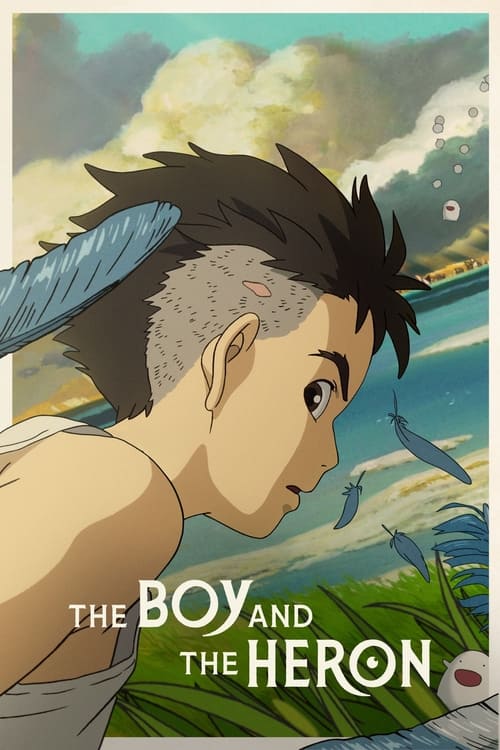The Boy and the Heron

Plot
Set against the backdrop of World War II, "The Boy and the Heron" unfolds as a poignant tale of loss, family, and self-discovery. Mahito, a teenage boy, is struggling to come to terms with the traumatic loss of his mother during the chaos of war. The city's urban landscape, once a hub of energy, has been transformed into a battleground, and Mahito feels the weight of his mother's passing acutely. Seeking solace, Mahito is relocated to the countryside by Natsuko, his new stepmother, who bears an uncanny resemblance to his late mother. Natsuko is a kind-hearted woman, yet her attempts to bridge the gap between Mahito and herself are hindered by her own grieving past and a deep connection to the rural village she now inhabits. Initially, Mahito finds solace in the tranquil environment of the countryside, but this ephemeral peace is short-lived. It is here, amidst this serene backdrop, that the narrative becomes increasingly vivid and strange, as a gray heron begins to wreak havoc in Mahito's life. This enigmatic heron appears to be following Mahito relentlessly, as if recognizing a deeper purpose in the young boy's existence. As the birds' presence intensifies, Mahito begins to feel an inexplicable connection to it, something that transcends the rational world he is familiar with. Dubbed the "long-awaited one" by the heron, Mahito becomes increasingly confused and overwhelmed. As tensions escalate, Mahito finds himself at odds with the supernatural heron, which appears to be defying his desires with every step, taunting him with an enigma that seems beyond comprehension. It is clear that the heron serves as a harbinger of change, but Mahito lacks the understanding and the courage to confront the symbolic revelations unfolding around him. Through Mahito's character progression and the persistence of the heron, the audience is drawn into a world of moral reflections, introspection, and self-discovery. Confronted with his own guilt, sorrow, and disillusionment, Mahito is forced to piece together the cryptic messages being conveyed to him through his mother's substitute and the mysterious heron. Meanwhile, Mahito navigates the complex bond developing between him and Natsuko, who bears an otherworldly bond to his late mother. As this affinity grows, so too do the anxieties surrounding Mahito's very existence. With the truth simmering just beneath the surface, Mahito is repeatedly faced with being pulled towards both his past and the uncertain future, neither able to entirely reclaim him. However, even as grief and anger threaten to consume him, Mahito finds the resilience to move closer to Natsuko and ultimately accept that she has become his wellspring of hope. The unfolding drama underscores the idea that love can, inexplicably, move beyond the boundary of blood relationship. Natsuko, grappling with her own past sorrows, comes face to face with her unique potential to build a new life, with Mahito at the center. Throughout the narrative, the arrival of the gray heron unfurls itself as a catalyst of greater transformation. It is here that Mahito experiences an uncanny reconnection to his past and gains a new appreciation for life amidst a global calamity. This convergence marks the beginning of Mahito's winding journey towards mending, restoration, and redemption, one founded upon a relationship he chose to acknowledge: his relationship with Natsuko and ultimately, the transcending aspects the mysterious heron embodied.
Reviews
Callie
Feels like a Satoshi Kon dream, halfway through.
Joseph
Just finished watching it. When the words "Hayao Miyazaki" appeared in the end credits, I felt a particular sense of melancholy, with a premonition that this might be his last film. What does a creator think about at the end of their life? How does he face the matter of death? The film's latter half, in its bizarre way, fully expresses these thoughts. His Ghibli is like a precariously stacked set of blocks, perhaps destined to collapse with his passing. The world he created is grand and magnificent, but the future ultimately belongs to the young.
Adam
What did I even just watch...? The whole movie felt like a fever dream during a nasty cold. I tried to grasp some semblance of meaning in the first half, but the second half was pure torture. I'm starting to think it's a Ghibli entrance exam – whoever understands it gets to inherit Miyazaki's legacy.
Ivy
The opening scene is the Tokyo air raid. The narration says, "In the third year since the war began, my mother passed away." Considering that the Second Sino-Japanese War had already been raging for over seven years at this point—and for the Japanese people, the war had only begun three years ago—it's difficult to feel genuine sorrow. Indeed, for a war that doesn't bombard your own homeland, there's no true pain or reflection.
Amy
I truly admire Hayao Miyazaki. After living through his eighties, experiencing war, oil crises, the collapse of the bubble economy, and so on, he can still say that even if the world is ravaged, we must return to it...
Recommendations




